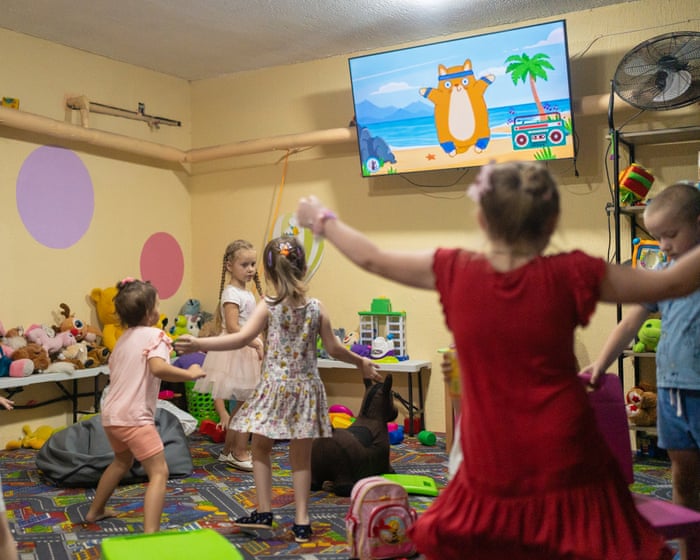
In the besieged city of Kherson, Ukraine, a stark contrast exists between the carefree play of children in a makeshift underground shelter and the constant threat of mortars, artillery, and drones raining down from the skies above. This underground haven, fashioned from plastic chairs and a shared desire for normalcy, offers children a precious respite from the war’s relentless reality.
For a few fleeting hours, within the shelter’s confines, the war seems to fade into the background. Teachers, ever vigilant, amplify the sounds of clapping and music to muffle the terrifying proximity of explosions, creating an illusion of safety for the children in their care. This sanctuary, however, is a testament to the pervasive impact the war has had on the lives of Ukrainian children.
As schools across Ukraine reopened this month, a sobering statistic emerged: one in three children are experiencing their fourth consecutive year of disrupted education. In frontline areas like Kherson, where schools have been heavily damaged or destroyed in attacks, education is largely conducted online, further isolating children from their peers and the essential social interaction crucial for their development.
The prolonged isolation, spent either at home or huddled in bomb shelters, has resulted in significant setbacks for children’s education and overall development. Frustration mounts as their learning and social growth stagnate, adding another layer of hardship to their already challenging circumstances. One mother, Valentina*, poignantly describes her son’s fear, noting his inability to distinguish between the safety of home and the dangers of the outside world: “My son asks me why he can’t go out, because he says he could be killed at home or outside – there’s no difference.”
The ever-present threat of death or injury hangs heavy over all civilians in Kherson. Russia’s systematic drone attacks, described as a “human safari” and potentially constituting a war crime, have instilled widespread terror. The tragic loss of a one-year-old boy, killed in a drone strike in July, serves as a horrifying illustration of the indiscriminate nature of these attacks.
The escalation of civilian casualties in recent months, largely attributed to Russian attacks using long-range explosive weapons and short-range drones, paints a grim picture of the conflict’s impact on innocent lives. Across Ukraine, the staggering figure of more than 3,000 children killed or injured since the start of the full-scale war in 2022, equates to approximately 150 classrooms full of children.
This relentless danger forces families to exist largely underground or indoors, constantly weighing the risk of each necessary trip outside against the potential cost of their lives. The resulting confinement has had a profound impact on children’s social skills, speech development, and overall confidence. Many are falling behind in their studies, some still struggling to learn basic skills like reading. As Narmina Strishenets from Save the Children observes, “Instead of focusing on play, socialising and passions, children are focused on physical survival. Many are now one or two years behind in core subjects. Childhood is under attack and they are losing hope.”
The underground play centre in Kherson, a hidden haven in a residential area, offers a glimmer of hope. Established by Oleh Turchynskyi, the centre provides a safe space for children to receive personal support from teachers and psychologists. The centre, initially established as a shelter in 2023, transformed into a vibrant hub where children aged one to their late teens can find companionship and engage in activities. Younger children sing, draw, and play games, while older children watch TV or socialize with friends.
Psychologists at the centre work tirelessly to alleviate children’s anxiety, address sleep disturbances, and manage conditions such as autism, which the war has exacerbated. One child, previously confined to a basement for months and consequently developing diabetes due to the stress, is now showing signs of recovery, regaining confidence through interaction with psychologists at the centre.
Turchynskyi himself is a testament to resilience. Despite suffering injuries in a drone attack that also critically injured his wife, he remains committed to his work, choosing to stay in Kherson and support the community. His unwavering dedication underscores the profound impact of the war on the lives of Ukrainian children and the extraordinary efforts of those working to alleviate their suffering. Valentina, whose home was struck by a drone and now lives with her son in fear, expresses the pervasive sense of despair that has enveloped their lives: “Every day life here gets worse… We exist rather than live.”

